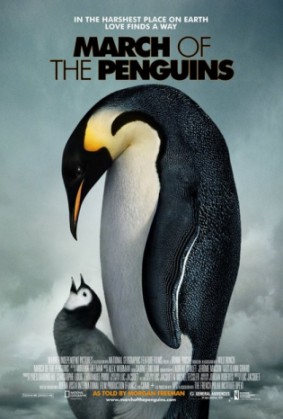|
March
of the Penguins
Regarding the life of emperor penguins:
there's got to be a better way.
Every year, for either hundreds or thousands
of years depending on which part of the narrative you listen
to, the emperor penguins in Antarctica leave the oceans
and make an arduous trek across the ice to their breeding
ground. After mating, the males and females take turns walking
back to the ocean to eat and sometimes predators get them.
That's really about it. It's a harsh life, but at least
there are cute baby penguins.
Not that March of the Penguins offers
any alternatives; instead, it seeks to shed a soft amber
light on the bleak cold that is the penguin mating season.
In its original French version (called The Emperor's
Journey -- American audiences apparently can't make
the symbolic leap), writer/director Luc Jacquet had the
penguins even speak, telling their story in an immediate,
personal way to get audiences to go "awwwww..."
Audiences still will, at least for the
first twenty minutes or so. We like penguins. And we like
Morgan Freeman, who now provides all the narration, written
by Jordan Roberts. Freeman's warm tones promise us that
this is a story about love, but Roberts really doesn't want
to go all out and make this cute. Stuck with footage that
clearly wants to tell a type of family drama, Roberts reverts
to being dryly scientific whenever things veer into heartwarming.
The result fits more into what National
Geographic would want, and they're behind the American release.
But it also leaves the film with a split personality, alternately
anthropomorphizing penguins when the scenes leave no choice,
but often admitting we don't know a single thing about their
motivations.
Because the scenes have been cut for a
different type of narration, Freeman often ends up dropping
tantalizing tidbits of information without being able to
explain them. The scene has moved on, and an audience might
just be wondering - wait a minute, how do these penguins
manage to save some sort of nutritional fluid for their
newborns after months of not eating? Check your local library.
Too
often our knowledge is limited to what can be observed,
and that's often where the English narration goes into mawkishness.
If a penguin looks sad, Freeman comments upon it, forgetting
that he has already said we have no real way of knowing.
Love finds a way, perhaps, but with penguins it really could
just be a biological imperative.
Since so much of this cycle involves the
titular march back and forth with no variation, it would
have been nice to have something - anything - new happen.
What does the larger community do? Michel didn't shoot it,
so Roberts can't script it. As
a result, March of the Penguins is interesting but
not particularly absorbing. Its G rating may attract a lot
of families, but be warned that it will spark long stretches
of restlessness among your young ones. I suspect The
Emperor's March would have been more effective for
them.
Rating:

|






